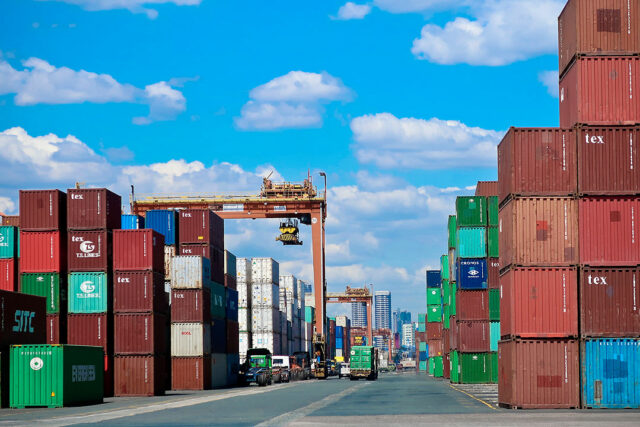Freight fees expected to climb further – BusinessWorld Online

By Arjay L. Balinbin, Senior Reporter
SHIPPING COMPANIES in the Philippines are likely to raise freight fees even more to cushion the impact of rising fuel costs on their operations, analysts said.
“There is a limit to cutting cost. The lines will have no choice but to pass on the cost to the cargo owners,” Philippine Liner Shipping Association (PLSA) President Mark Matthew F. Parco told BusinessWorld in a phone message on May 19.
Asked if freight fees are projected to increase further, he responded, “Yes, not only fuel but everything else is rising such as forex, parts, wages, etc.”
“Certainly, there will be another round. Maybe similar quantum,” he added, noting that shipping lines “face the same problems.”
Freight fees have already gone up by an average of 25% this year, reflecting the impact of the spike in oil prices.
As of May 17, year-to-date adjustments are at a net increase of P21.60/liter for gasoline, P31.40/liter for diesel and P27.65/liter for kerosene.
Rizal Commercial Banking Corp. Chief Economist Michael L. Ricafort said higher costs are widely expected to be passed on to passengers and cargo customers.
“(The) ability to pass on higher costs would be a function of competition or even potential demand destruction or lower demand due to higher shipping prices/fees that lead to lower demand,” he said in an e-mailed reply to questions.
Cost-cutting measures would be the firms’ “second layer of defense,” Mr. Ricafort said, adding that they may need to adopt better technologies to increase operational efficiency and prevent operating losses.
“Higher costs, largely due to higher oil/energy/fuel prices, which comprise a large chunk of the cost structure of shipping companies would lead to either higher prices (but could be mitigated/limited by competition) and/or cost-cutting measures to make up for the narrower profit margins,” he said.
The International Monetary Fund has said the rise in global shipping costs would likely cause quicker inflation in import-dependent economies until the end of the year.
The Philippines is a net oil importing country. Inflation quickened to a three-year high of 4.9% in April, the highest in more than three years as food and energy prices soared,
“Main culprit remains to be coronavirus and the war in Ukraine. Insofar as COVID is concerned, it’s still biting. We saw China go into lockdown mode on elevated cases, and this shuttered major trading ports leading to supply chain difficulties. And then of course, there’s revenge spending going on as well in other economies so that leads to supply and demand imbalances,” Security Bank Corp. Chief Economist Robert Dan J. Roces said in an e-mailed reply to questions.
Mr. Roces said the ongoing war in Ukraine and sanctions against Russia have continued to drive up prices of oil and other major commodities. “What we are seeing right now are more upsides in inflation risk,” he added.
PLSA’s Mr. Parco said the group will submit its policy recommendations to the new Transportation Secretary, including how to address “high increases” in tariff.
For his part, Mr. Ricafort said further reopening of the economy would help boost passenger travel and cargo businesses
“Measures to further reopen the economy towards greater normalcy amid the further easing of restrictions with the adoption of the lowest Alert Level 1 in more areas around the country that supports further recovery of passenger travel and cargo business would definitely help generate more sales/topline figures for shipping companies, in terms of higher passenger and cargo revenues/sales, with some upward adjustments in shipping fares/fees, to help make up for the increase in operating costs largely due to higher oil/fuel prices,” he said.
The impact of rising fuel costs can be seen in the first quarter financial results of some listed firms involved in the shipping business.
Lorenzo Shipping Corp. swung to an attributable net loss of P30.83 million in the first quarter, compared with a net profit of P42.72 million in the same period a year earlier.
“There was an increase in direct cost amounting to P796 million from last year of P711 million mainly due to soaring fuel prices,” the company said in its first-quarter report. Lorenzo Shipping’s revenues increased by 1.88% to P795.17 million “due to determined efforts to recover increasing costs through surcharges and freight adjustment.”
Meanwhile, Chelsea Logistics and Infrastructure Holdings Corp. saw its attributable net loss widen to P415.64 million in the first three months from a loss of P218.07 million in the same period in 2021. Revenues went up by 13.04% to P1.30 billion in the January to March period.
“Fuel prices continued to increase with the Ukraine conflict and this pushed the group’s bunkering cost to P486 million, a 43% increase year on year. Consequently, cost of sales and services escalated to P1.22 billion,” it said.
But the increase was “tapered off by the decline in depreciation and amortization cost by 25% or P94 million to P287 million in 2022 due to the disposal of certain vessels in prior year and extended drydocking of some vessels until this period,” it added.
2GO Group, Inc. narrowed its attributable net loss to P34.9 million in the first quarter from a loss of P291.12 million previously. Total revenues were flat at P3.99 billion.
“Our company focused on profitable services and customers, while driving efficiencies in our operations and stringently controlling costs,” it said. “The group uses derivative instruments to manage exposures to fuel price risks arising from the group’s operations and its sources of financing.”
2GO said its cost of services, pertaining to fuel, oil and lubricants, increased by 60.19% to P538.27 million in the first quarter.
Brent crude rose by 0.46% to $112.55 per barrel as of May 21, while US crude was up 0.35% to $110.28 a barrel.
For all the latest Business News Click Here
For the latest news and updates, follow us on Google News.
